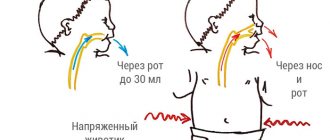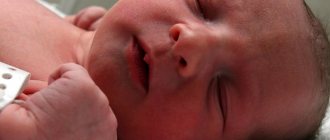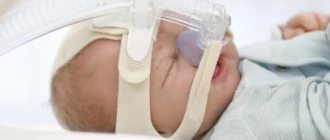Why does a baby often spit up?
In a newborn, the digestive tract functions physiologically differently. It has not yet fully matured, like the nervous system, which is responsible for contracting the smooth muscles of the stomach. Therefore, functional abnormalities are common in children under one year of age, which most often resolve on their own and do not require special treatment.
Regurgitation, or regurgitation, is the involuntary reflux of eaten food from the stomach into the esophagus and oral cavity. At the same time, the baby’s diaphragm and muscles of the anterior abdominal wall do not contract, as with normal vomiting. The baby is not bothered by this process, he does not cry, and his body temperature and skin color remain normal. The volume of milk released is small, usually it does not exceed 1-2 tablespoons.
The reasons why a child often spits up must be sought in the feeding habits of the baby. The main factors include the following:
- overfeeding - if the volume of food does not correspond to the age norm, the stomach cannot accommodate it and quickly digest it, so the milk puts pressure on the sphincter between the stomach and the esophagus, part of it comes out;
- aerophagia - swallowing air during feeding if the mother gives the breast incorrectly or uses the wrong nipple on the bottle;
- accumulation of gases in the stomach and intestines, colic - air reduces the volume of the stomach, and after eating it tends to escape, as a result of which the baby burps;
- tight swaddling - diapers put pressure on the stomach and prevent it from stretching after eating;
- incorrectly selected formula during artificial feeding or intolerance to cow protein;
- high activity after eating, lying on the stomach or back.
The cause of regurgitation may be a lack of feeding regimen. It is wrong to regard every baby's cry as a sign of hunger. Even when feeding on demand, it is necessary to maintain time intervals of at least an hour in the first month of life and gradually increase it.
A baby born prematurely, or with signs of intrauterine growth restriction, will spit up more often than other babies. This is due to anatomical and physiological features: the stomach in such children has a spherical shape and reduced volume. The sphincter at the border of the stomach and intestines is often spasmed and cannot quickly pass food. But by the first year the baby will stop burping.
Sometimes the causes of regurgitation are associated with various pathologies. You cannot do without a doctor if the baby has persistent pylorospasm, has malformations of the gastrointestinal tract, or has had a trauma to the nervous system.
Why does a baby spit up after formula feeding?
In most cases, a child spits up formula for physiological reasons that have nothing to do with pathologies. In some cases, this phenomenon is one of the symptoms of diseases of internal organs and systems.
- swallowing air during feeding (it is recommended to change the bottle);
- the child eats quickly and greedily (during feeding it is better to take short breaks of 5-10 seconds);
- overfeeding (excessive amount of mixture entering the stomach);
- allergies (if the mixture is not suitable, an allergic reaction may occur, which is accompanied by regurgitation);
- swaddling too tight;
- colic, constipation, increased gas formation;
- pathological processes in the gastrointestinal tract.
In what cases should the baby be shown to the pediatrician:
- a sharp increase in the volume of regurgitation;
- the baby spits up more often than usual;
- during regurgitation, the baby cries, arches his back, and his body temperature rises;
- there is a loss of body weight;
- the child sometimes vomits (the vomit has a yellowish tint due to bile impurities);
- regurgitation occurs even after the baby is one year old;
- after regurgitation, the baby asks to eat, he develops symptoms of dehydration.
What should I do if my baby spits up after formula feeding?
Despite the fact that in most cases, spitting up is a natural process characteristic of babies up to 6-7 months, not every parent will like to wash their clothes every day due to stains and the unpleasant smell of vomit. Experts most often advise waiting a little until everything goes away on its own. But not all mothers and fathers are so patient.
Currently, there are no drugs that can reduce the number and volume of regurgitation. The only thing a pediatrician can recommend is taking products that help reduce gas formation, based on fennel seeds and simethicone (for example, Espumisan). Due to the decrease in gas pressure on the walls of the stomach, the baby will burp less often. You can also replace the usual adapted mixture with an anti-reflux (thicker) one.
Useful recommendations for parents if the child spits up after formula:
- carry the baby in a column position for as long as possible after feeding (the more air released in an upright position, the less formula he will burp later);
- for some time, you should reduce the volume of formula that is given at one time (the question of how much less to feed the baby is decided exclusively with the doctor);
- a newborn can be swaddled at night (swaddling helps reduce nervous activity and reduce pressure on the gastric walls);
- try to ensure that the child leads an active lifestyle - walk with him more often, carry him in a sling, visit the pool, massage courses (this will help speed up the process of strengthening the baby’s muscles, including those involved in digestion);
- Before going to bed, it is recommended to give the baby a pacifier, you can allow the baby to suck his finger (sucking movements stimulate the gastrointestinal tract, although food no longer enters the stomach, as a result, the previously eaten mixture is better absorbed and does not come out).
Spitting up in a baby is not a cause for concern. If the baby begins to do this more often, parents must consult a doctor. Early detection of a problem will help you deal with it quickly. The specialist will determine the causes of regurgitation, prescribe the necessary tests and give recommendations on how to quickly cope with the problem without harming the baby.
Author-expert: Alexander Alekseevich Sedulov, diagnostician
Now you know everything about why a baby spits up after formula feeding. We hope you liked our article. Share with friends, leave comments - we will be happy to answer!
When a baby spits up after feeding formula, any mother begins to worry about this, since this seems to them to be signs of illness. In fact, the natural process of releasing food from the stomach, which occurs in some children after eating, is quite normal, and experts do not see any cause for concern in this. Still, constant regurgitation may indicate the presence of some health problems, so it is necessary to carefully monitor the condition of children.
What to do if your baby spits up
If a child spits up for physiological reasons, you can reduce the frequency and severity of this condition yourself. They start with nutritional correction. When breastfeeding, make sure that the nipple is grasped correctly along with the areola and the position of the baby. The mother should feed him while sitting, holding the baby at an angle of 45-60°. In this position, air naturally leaves the stomach and there is less risk of food reflux into the esophagus. After eating, the baby should be kept upright for 20-40 minutes.
You can remove some of the air from the stomach before feeding; for this, the newborn baby is laid on his stomach for 10-15 minutes. If the baby has a tendency to intestinal colic, a light abdominal massage helps, which is done in between meals.
Regurgitation in an infant is not an indication for switching to artificial formula; the woman should continue breastfeeding. But it is recommended to adhere to the intervals between meals, and for the mother to follow a hypoallergenic diet, and also exclude cabbage, brown bread and legumes.
To stop a bottle-fed newborn from burping, you need to buy an anti-colic feeding bottle or a special pacifier. Their design differs from traditional ones. The bottle has a special valve that prevents air from being swallowed while eating. It is also necessary to control that the diameter of the hole on the nipple does not allow milk to flow out in a stream; it should drip slowly.
When purchasing formula for a baby who constantly spits up, you should consult a pediatrician. He may recommend a hypoallergenic formula or milk without cow's protein. In some cases, it is necessary to completely avoid animal protein in the composition.
Normally, complementary foods begin to be introduced from the fourth month, but when milk is regurgitated for children older than 1-2 months, various nutrition thickeners can be included in the diet. These can be special mixtures with rice flour or dairy-free rice porridge, but use no more than 1 teaspoon at a time.
With natural feeding
If you are breastfeeding, it is important to create a calm environment during feeding to avoid possible problems with lactation. And also normalize the baby’s feeding regimen, excluding overfeeding, control the correct attachment to the breast so that he does not swallow air while sucking. Since regurgitation in a baby can be a manifestation of food intolerance, if necessary, you can be prescribed a hypoallergenic diet.
Don't worry and remember that regurgitation is almost never an indication for stopping breastfeeding. Typically, after 6 months, the number of spitting episodes decreases significantly.
Regurgitation norms for infants
How many times a day should a baby regurgitate excess food? There should be no cause for concern if:
- regurgitation occurs up to 5 times a day;
- volume no more than 2-3 tablespoons;
- The discharge is a curdled mass of curdled milk.
What to do if your baby starts spitting up more often
You can reduce the amount of regurgitation in a healthy baby yourself. What changes can be made to breastfeeding:
- Make sure that the baby's mouth captures both the nipple and the areola. This will reduce the amount of air swallowed when eating;
- feed the baby while sitting, holding him at an angle of 50-60 degrees. Then the air trapped in the stomach will come out naturally, and the amount of food thrown into the esophagus will decrease;
- after eating, hold the baby upright for 20-30 minutes;
- in between feedings, do a light tummy massage or put the baby on his stomach for a quarter of an hour. This removes excess air from the stomach and reduces colic;
- stop feeding the baby after regurgitation;
- observe intervals between feedings;
- watch where food goes when regurgitated. It is imperative to clean the nasal passages so that leftover food does not become a favorable breeding ground for bacteria.
A nursing mother should follow a diet and exclude cabbage, yeast rye bread, and legumes from the diet.
Pathological regurgitation
If a child spits up often and in large quantities, and not only after feedings, but also during daytime and night sleep, one may suspect the presence of health problems. If it seems to you that regurgitation occurs too often and even at night, watch the child, or better yet, record for several days how often (time of regurgitation) and approximately in what volume they occur. This will help the pediatrician give an answer during the next examination whether it is worth worrying and start undergoing examinations. For example, the following causes of regurgitation can be identified.
Malformation of the digestive organs.
As a rule, these defects are detected in the maternity hospital. We can talk about violations of the patency of the esophagus and stomach. With such defects, regurgitation occurs profusely and often, sometimes repeatedly after one meal.
Food allergies.
An allergy to cow's milk protein is quite common - in this case, after consulting a doctor, a bottle-fed child is transferred to formulas with highly hydrolyzed protein.
The mother of a breastfed child has her diet adjusted to the exclusion of cow's milk proteins.
Gastroesophageal reflux disease.
This disease is suspected when regurgitation occurs frequently and in large volumes, day and night, does not decrease by 6 months and does not go away after a year.
Causes of regurgitation
A completely healthy toddler with a good appetite under the age of one year still does not know how to control either the amount of food he eats or the correctness of its intake. The cause of regurgitation may be banal overeating, especially if he eats mother's milk. The process of breastfeeding calms the baby, gives him a feeling of security and he is ready to do this for hours. The tiny stomach, which cannot yet stretch, and the short esophagus quickly fill up and the body resorts to the only way it knows how to get rid of the excess.
Causes of regurgitation in infants
The second reason is air getting into the mouth. Here all the blame lies with the mother. You need to carefully ensure that the baby takes the nipple tightly, and if you feed from a bottle, you need to hold it at the right angle and at the same time make sure that after shaking the mixture all the foam rises up. You should also choose the optimal size of the hole in the nipple so that not a single air bubble leaks out.
After feeding, you should not immediately put the baby in the crib, especially on his stomach, stir him up, bathe him or even change him. Active exercises should be done either before meals or about an hour after feeding. It is necessary to hold it in an upright position and lightly massage the tummy.
If the little one is cheerful, active, gaining weight well and regurgitation, if it occurs, then no later than an hour after he ate a hearty meal, then everything is fine and there is nothing to worry about. The gastrointestinal tract is not fully formed and strengthened, it is still adapting and some problems in its functioning are quite normal. Over time, when the stomach learns to stretch and the muscles responsible for the functioning of the esophagus and intestines become stronger, everything will return to normal.
These reasons are clear to everyone, they do not pose a great danger to the baby’s health and are easily eliminated. However, if a child burps up a mass in which yellow streaks, inclusions, or the entire vomit is clearly yellow in color, are noticeable, this is a reason not only to think about it, but also to contact a specialist. And if this happens periodically and is accompanied by crying, screaming and unnatural movements - even more so. In this case, comprehensive research and prompt diagnosis are necessary. You should start by seeing a pediatrician and having your child undergo a diagnostic ultrasound of the abdominal cavity.
Regurgitation as a natural process
Most often, the reason for regurgitation is physiological. In this case, apart from the release of a small amount of milk, nothing bothers the baby. The baby remains calm, does not cry or be capricious. Sometimes after regurgitation, he even begins to smile, because he feels relieved.
If we talk about standards, the amount of liquid should not exceed 10 ml. This is about two tablespoons. The permissible frequency of regurgitation is up to 5 times a day, mainly after feeding. In this case, the vomit should not have a strong odor. The consistency can be liquid or curdled. The more time passes after feeding, the denser the secretion will be. The normal color of vomit is transparent white.
Why do newborn babies spit up? This phenomenon is primarily associated with the immaturity of the children's digestive system, as well as the location of the stomach. The main reasons usually include the following:
- physiological weakness of the esophageal sphincter;
- small volume and high location of the stomach;
- swallowing air during feeding;
- insufficient coordination of sucking, swallowing and breathing (lasts up to 2 months);
- enzyme immaturity;
- binge eating.
According to statistics, 67% of infants up to a certain age spit up breast milk, while physically they are completely healthy.
Sometimes milk may come out through the nose, for example, when the baby is lying down. In this case, it is important to ensure that the newborn does not choke. You need to turn him tummy down and lightly pat him on the back. Next, the nasal passage must be cleaned with an aspirator.
Possible complications
Frequent regurgitation is a reason to consult a doctor
One of the dangerous consequences of vomiting water is the fact that a baby who is in a horizontal position may choke. This phenomenon can cause the airways to become blocked, resulting in pneumonia.
Read: Proper nutrition during early pregnancy: expert advice
In the presence of other dangerous symptoms and untimely treatment of diseases, pathological processes in the digestive organs (for example, pyloric stenosis) and diseases associated with metabolic disorders are possible.
If regurgitation is profuse, this condition can lead to the following consequences:
- Poor weight gain
- Dehydration
- Esophagitis is an inflammatory process of the esophageal mucosa
Apart from this problem, regurgitation of water is not complicated by pathological conditions.
In the video - information for mothers:
18 Dec 2021 Yuki 1054
Share this post
We recommend reading along with this article
- Feeding, sleeping, staying awake in the mode of a 2 month old baby
- How to bottle feed your baby correctly: simple tips
- How to get rid of air belching using medicinal and folk methods
- The drug Creon: side effects and dosage for children
- Similak Premium: composition, feeding schedule, reviews
- Intestinal infections and other unfavorable factors - how...
- How to treat a cough with sputum in a child - folk...
- Creon for babies
- When and how to properly introduce the first complementary foods to a baby











